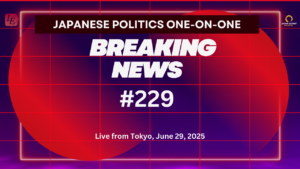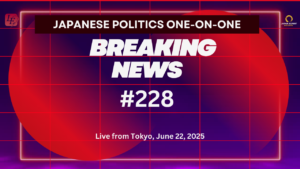The ranks of fellow-Japan-Hands are growing as people globally are increasingly interested in what’s going on in Japan. It is truly amazing how our audience has grown. Thank you. If you are new into this glove, welcome!
- The week closed at 149.76¥/$. Inflation higher than expected, US on two-day holiday;
- Diet opened on Thursday (24-day extraordinary session), PM spoke to both Houses on Friday so lots to come on Monday, Tuesday and later in the week;
- Tamaki of DPFP continues to push for raising the income tax threshold. He wants to raise it from ¥1.03 million up to around ¥1.78 million. Ongoing bargaining. Temperatures are also rising.
Challenges and Shifts: Japan’s Parliamentary Session Under PM Ishiba
Japan’s parliamentary session commenced with the Emperor ceremonially opening the Diet, fulfilling his constitutional duties. Prime Minister Ishiba addressed both Houses, laying out his policy agenda amidst the challenges of leading a minority government. The Liberal Democratic Party (LDP), even with its coalition partner, lacks a majority (pretty far from it, actually), complicating the passage of legislation and forcing greater let’s-be-nice collaboration with opposition parties.
Policy Priorities and Delicate Governance
Ishiba’s speech focused on defense, security, disaster management, and domestic reforms. He recounted his international engagements with leaders from China, South Korea, and the United States, signaling Japan’s commitment to global diplomacy. Domestically, he touched on raising the tax-free income ceiling, stagnant for 20 years, a policy championed by opposition leaders like Tamaki, whose party gained significant ground in the recent election precisely on that issue. Urban revitalization and measures to counter rural depopulation also featured prominently, reflecting Ishiba’s long-standing priorities.
Political Challenges and Scandals
The government is under pressure from slush fund scandals tied to the LDP, originating during the Kishida administration. These funds, associated with party factions redistributing political contributions, have drawn intense scrutiny. Opposition parties, particularly the Constitutional Democratic Party (CDP) and the Democratic Party for the People (DPFP), are leveraging this issue to challenge LDP dominance. Budget Committee hearings this week, chaired by an opposition leader for the first time in over 20 years, are expected to focus on these scandals.
Cybersecurity and Intelligence Ambitions
A Cybersecurity Bill, critical for Japan’s integration with international intelligence frameworks like Five Eyes, has been pushed to the regular Diet session in January. This legislation, aimed at bolstering Japan’s capacity to monitor and block foreign communications, reflects growing urgency amid rising geopolitical tensions. The government has tasked Digital Minister Taira with drafting and advancing the bill.
Outlook and Implications
With political reform, defense, and fiscal policies under intense debate, this parliamentary session highlights the complexities of Ishiba’s position. His ability to navigate these challenges will not only determine his Administration’s stability but also shape Japan’s political landscape ahead of next year’s Upper House elections. The session concludes on December 21. The ordinary Diet session is set to begin in January (date to be set soon).
Japan’s Balanced Approach: Supporting Israel and Palestinian Refugees
Japan balances strong ties with Israel and humanitarian support for Palestinian refugees. Its relationship with Israel is marked by technological partnerships and robust diplomacy, reflecting mutual strategic interests.
At the same time, Japan collaborates with the UN Relief and Works Agency (UNRWA) to address the Palestinian refugee crisis, recently reaffirmed by the Prime Minister’s meeting with UNRWA’s chairman amid an “unprecedented humanitarian crisis.”
While maintaining its close ties with Israel, Japan also monitors broader regional issues. These include the fragile ceasefire between Israel and Hezbollah, showcasing its commitment to both strategic and humanitarian responsibilities.
Tamaki’s Rising Influence: A Political Balancing Act in Japan
Tamaki’s Position and Strategy
Yuichiro Tamaki, leader of the Democratic Party for the People (DPFP), has emerged as a key figure in Japan’s political landscape. Despite being in opposition, his party’s recent electoral success has prompted the ruling Liberal Democratic Party (LDP) to seek collaboration. Tamaki strategically uses this to extract concessions for his party’s priorities, strengthening his base ahead of the next Upper House election.
Challenges Within the Opposition
The Constitutional Democratic Party (CDP), Japan’s main opposition party, criticizes Tamaki for aligning with the LDP, arguing that this undermines opposition unity. The CDP, under its new leadership, has committed to opposing the LDP rather than seeking alliances. This division among opposition parties mirrors historical patterns where smaller parties, like the Democratic Socialist Party or Komeito in the 1960s, faced similar dilemmas about maintaining distinctiveness while challenging LDP dominance.
Policy Friction and Risks
Tamaki’s proposals, such as raising tax-free salary thresholds and expanding nuclear energy, have stirred debate. While appealing to parts of the electorate and some within the LDP, they create friction with Komeito, the LDP’s coalition partner, and other opposition groups. If Tamaki overplays his hand, he risks alienating allies and losing leverage.
Historical Context and Durability of Opposition
Japan’s political history shows that opposition parties struggle to sustain momentum against the LDP, which often co-opts popular issues to maintain dominance. For third parties like the DPP to succeed, they must maintain clear distinctions and offer compelling alternatives.
Future Implications
The DPP’s success or failure will influence both the opposition’s cohesion and the LDP’s strategy. With the Upper House election and critical legislative debates looming, the dynamics between Tamaki’s DPP, the CDP, and the LDP will shape Japan’s political trajectory.
Amazon Under Scrutiny: Japan’s FTC Cracks Down
FTC Raid on Amazon Japan
Japan’s Fair Trade Commission (FTC) conducted an unannounced raid on Amazon Japan this week, targeting alleged anti-competitive practices. Such raids are severe disruptions for businesses, often halting operations for days or weeks as investigators collect evidence and restrict activities.
Allegations of Market Dominance
The FTC is investigating claims that Amazon abused its market power by:
- Price Suppression: Forcing sellers on its platform to lower their prices.
- Bundling Services: Compelling sellers to purchase additional services, boosting Amazon’s revenue but potentially unnecessary for their client-sellers.
Significance of the Case
Amazon’s dominance in Japan’s e-commerce market makes this case particularly impactful. It underscores growing global scrutiny of large tech firms for anti-competitive behavior. The investigation’s outcome could set a precedent for market practices and regulatory measures in Japan.
Next Steps
As the FTC’s investigation unfolds, the implications for Amazon’s operations in Japan and its broader strategy will be closely monitored. Further updates will follow as developments occur.
Questions from the Audience Addressed Exclusively During the Briefing
- Is the DPFP working on a change of leadership with the recent elevation of Diet Affairs Chief Motohisa Furukawa to DPFP deputy leader given that Mr. Tamaki’s publicly disclosed romantic affair could make him unlikely to be seen as PM material?
- What is Timothy’s view on the end-game for the funds accounting scandal. Have we reached the stage where people are attempting to flog a dead horse?
- From Washington D.C. it is hard to see what Ishiba’s vision for Japan and the US consists of. What key characteristics do you believe the ideal next ambassador to Japan should possess given the importance of the US-Japan alliance, regional security challenges, and economic and technological collaboration in the Indo-Pacific?
- President-Elect Trump plans to impose tariffs on Canada, Mexico and China to tackle illegal immigration and drug trafficking. He has threatened 100% tariffs on BRICS nations if they challenge the US dollar’s dominance, although Japan is not directly targeted by these tariffs, how might the broader shifts in US trade policy affect the US-Japan economic partnership?
- If BRICS countries move away from the US dollar, what impact might this have on Japan’s yen and its role as a regional economic stabilizer?
- How might Japan review its active cyber-defense bill in light of Trump’s historical distrust of intelligence agencies and his plans to overhaul US intelligence?
- What is the difference in meaning between ‘government council of experts’, ‘a political party study group’ and ‘a bureaucrat study group’?
Are you familiar with “Tokyo on Fire”? Episodes are available on YouTube “Langley Esquire”: excruciatingly-gained insights sifted over 40 years in-country! Entertainingly presented.
“Japanese Politics One-on-One” episodes are on YouTube “Japan Expert Insights”.
If you gain insight from these briefings, consider a tailored one for your Executive Team or for passing-through-Tokyo heavyweights.
To learn more about advocacy in Japan, read our article “Understanding the Dynamics of Lobbying in Japan.”
Join the Success!
Experience exceptional, personalized solutions designed to meet your business’s specific needs. Discover how we can elevate your operations to the next level.




